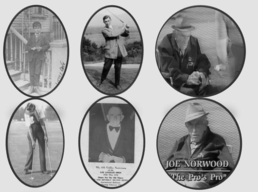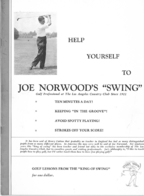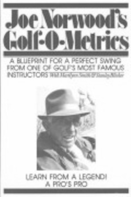The Joe Norwood Golf Grip excerpts from Book II
by Daniel Norwood on 12/02/15
The Grip Re-Visited
By Dan Norwood
12/2/2015
How
to obtain the Joe Norwood Grip without using a club.
1. Let’s
begin with the right hand
a. Put
your right in front of you and just make sure the palm is facing 12:00, the
thumb is extended away from the other fingers and the remaining 4 fingers are
inline.
i. Think
of it as a straight surface similar to a martial arts “Karate” chop position.
b. All
4 fingers have 3 joints, the thumb has two. It is imperative that you
understand about the 3 joints of the fingers.
c. Index
finger position
i. The
index finger position is very important in obtaining the “Hook” as Joe would
put it.
ii. Keeping
the tip of the index finger in line with the middle finger move the index
finger into the hand.
iii. While
performing this move you will notice the 2nd joint of the index
finger raises above the middle finger. This is called the “Hook”
iv. Make
sure there is no straight line with any of the joints. The 3rd joint
of the index finger will be pointing to the direction of the nail on the middle
finger, the 2nd joint will be elevated above and inside the “Pad” of
the middle finger.
v. Practice
this move a few dozen times before this next move.
vi. With
the “Hook” now in place and the thumb off to the right just bring the tip of
the thumb to the tip of the index finger and you should see a “V”.
1. Keeping
the “Hook” in place begin moving the thumb away from the tip of the forefinger
by using the 1st joint of the thumb, it reacts like a hinge. All you
need to do now is just keep the forefinger in position and move the thumb back
and forth until this action becomes comfortable.
2. Never
let the index finger tip drop below the middle finger just keep the index
finger in line and move the thumb to the index finger.
2. The
left hand
a. The
left hand is performed exactly as the right hand and in the same order. It may
take a little longer with the left hand for right handed golfers.
3. Once
you become comfortable with both hands you can then take your grip and the
Right Pinkie or small finger will latch into the hook of the index finger.
4. Since
the right palm sits on the left V it is imperative that the left thumb not be
protruding or extending thus creating an uncomfortable position for the right hand.
a. Make
sure both thumbs and forefingers align evenly, this will take some effort in
the beginning but will become second nature as you become better influenced
with this grip.
5. Both
hands:
a. When
the grip is proper both primary joint knuckles of the middle finger of each
hand will be noticeable. To check this all that is needed is to look down at
your grip. If you cannot see the middle finger knuckle all you have to do is
turn in each hand and if you can see the third finger knuckle then all that is
needed is for you to turn out the appropriate hand.
b. Once
you get the grip you will have completed the first phase of the Sealed Wrists.
c. The
2nd phase of the sealed wrists begin with cupping or moving each
wrist north to its maximum. This is called a concave wrist.
d. Understand
that the wrists only move in four directions. There is no roll with the wrists
there is only movements North and South and East and West.
e. There
is roughly 180 degrees in flexibility in the wrists on and East – West Basis
and 90 degrees on a North South Basis. The 135 degrees East – West basis is one
of the main causes of swing error with the hands.
f. You
can determine this for yourself simply by extending your right wrist back as
far as it will go which is about 45 degrees then extend the same wrist from
that position forward as far as it will go and you will see this flexibility is
roughly half a circle or 180 degrees.
i. East
extends back to a maximum of 45 degrees from square.
ii. West
extends forward to a maximum of 135 degrees and a total of 180 degrees from
each point of East to West maximum.
g. You
can also check the North – South basis from square simply by moving your wrists
North and South. The extensions or flexibility is roughly 45 degrees in each
direction.
6. Sealed
Wrist
a. So
assuming you are able to understand the above, the second phase of the seal is
the extension of both wrists North to there maximum, this will result in a
concave wrist of both hands.
b. The
final phase of the seal is during the first motions of the backswing with the
hands as the right hand locks into its maximum Eastern Basis which is 45
degrees thus pulling the left wrist along to extend itself so that the left arm
is lengthened by 2-3 inches depending on the size of your hands.
7. At
no time during the swing do the hands release from their seal. Once locked the
hands hold the club head back of the hands and the hands move through the
impact zone and into the follow through zone
well before the club ever gets to that position, although it may seem
differently due to the extreme speed of the arms.
8. Once
you become comfortable with the grip then the next step is to learn how to
perform this swing without a golf club utilizing the Joe Norwood Grip
a. This
two will take a bit of work and (at first) feel uncomfortable until you begin
to get the feel from the mechanics.
b. Looking
at both hands you interweave the last 3 fingers of each hand together leaving
enough room to turn in the left wrist into the right palm. Do not clasp the
hands just interlock the last 3 fingers lightly.
c. Then
take the left thumb and forefinger V position and turn the left and 45 degrees
into the right palm. The left thumb will hug the end of the right palm just
like with the regular grip. The difference here is that the hands are more
compact due to their interweaving clasp of the last 3 fingers.
d. Once
the left V is in position then roll the right hand over the left V and allow
some flexibility with both hands to fit into their positions.
i. Once
completed you will be able to see both middle finger knuckles and both thumbs
and forefingers will be in position so that you can then create phase 2 of the
seal and phase 3 of the seal simply by moving your hands and locking them.
ii. The
arms don’t move.
iii. There
is no club to be concerned about
iv. Your
grip is secure
v. You
can continue to work on your grip until you “Own” it
vi. Once
you own the grip then you can begin your swing practice which is something to
be discussed later.





